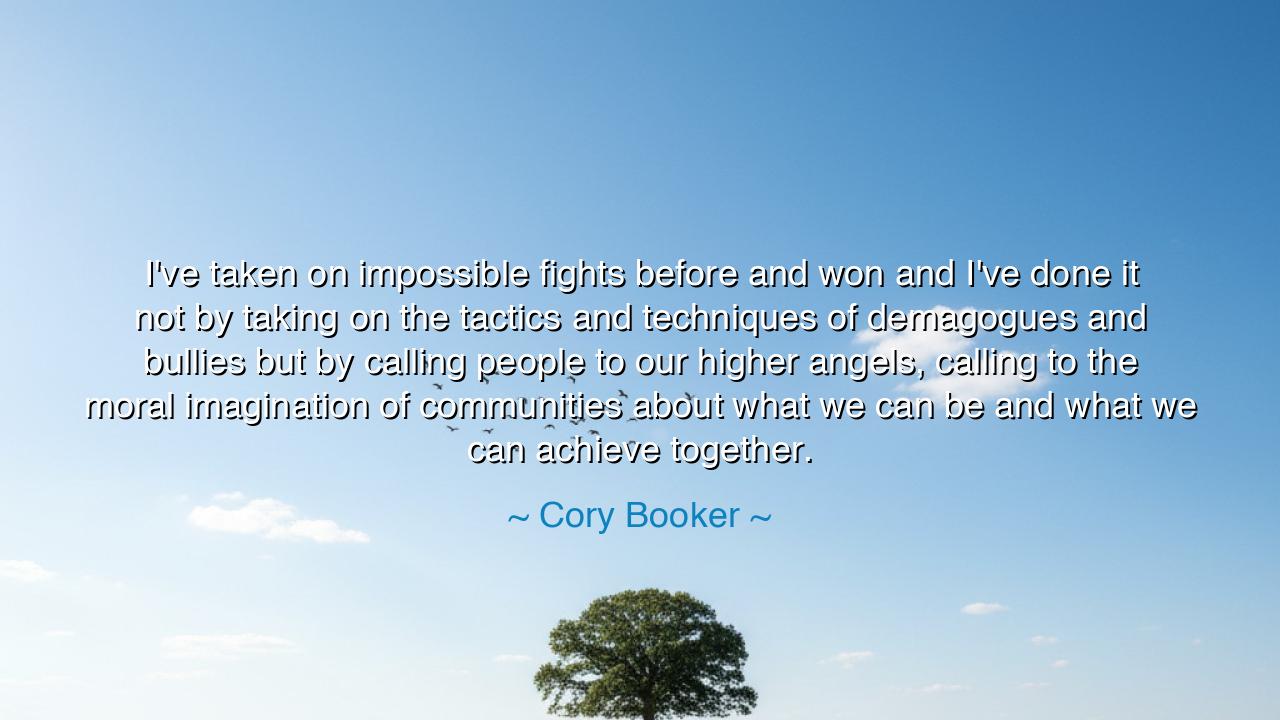
I've taken on impossible fights before and won and I've done it
I've taken on impossible fights before and won and I've done it not by taking on the tactics and techniques of demagogues and bullies but by calling people to our higher angels, calling to the moral imagination of communities about what we can be and what we can achieve together.






The words of Cory Booker — “I’ve taken on impossible fights before and won, and I’ve done it not by taking on the tactics and techniques of demagogues and bullies, but by calling people to our higher angels, calling to the moral imagination of communities about what we can be and what we can achieve together.” — resound like the speech of a warrior of light standing before the gates of doubt. In them lies not only courage but a profound faith in the moral imagination of humanity — that sacred power which lifts men and women beyond fear, beyond hatred, beyond the smallness of self, and into the vastness of unity. Booker speaks not of political victory alone, but of spiritual triumph, of how to win the battles that matter without losing one’s soul.
This quote arises from the ancient struggle between two paths: the path of fear and the path of hope. Demagogues and bullies thrive by awakening the basest instincts of humankind — by sowing division, by feeding upon anger and despair. Yet those who call to the higher angels — as Booker does — speak to what is eternal in us, to that divine voice within every conscience that whispers of justice, mercy, and shared destiny. This battle between the high and the low, between the noble and the cruel, is as old as civilization itself. It is not fought in the streets alone, but in the secret chambers of the heart, where every person must choose what kind of world they wish to build.
Throughout history, there have been those who, like Booker, believed that moral imagination could move mountains. Consider the example of Abraham Lincoln, whose own words echo in Booker’s: “The better angels of our nature.” Lincoln, standing amid a nation divided by war and hatred, refused to answer cruelty with cruelty. He called instead for healing, for a vision of America not yet born but deeply possible. And though his life was taken, his faith in the higher angels of humanity endured, guiding generations beyond him. Both men — Lincoln and Booker — remind us that leadership is not the mastery of others, but the awakening of what is best within them.
To call to the higher angels is an act of both faith and defiance. It is to believe, against evidence and cynicism, that people can be moved by goodness as deeply as they are by fear. Booker’s life itself bears witness to this belief — from his days as a young mayor of Newark, walking the streets, knocking on doors, listening to the cries of his community. He met anger with compassion, violence with perseverance, despair with imagination. His victories, as he declares, did not come from adopting the weapons of his opponents, but from refusing them — from wielding instead the invisible weapons of hope, love, and moral clarity.
In the ancient world, the sages called this power virtue, the alignment of the soul with truth. A warrior guided by virtue does not need to mimic the tactics of the unjust, for his strength comes not from deceit, but from conviction. As the Stoic philosophers taught, it is better to fall with honor than to triumph in corruption. Yet Booker’s words remind us that one need not fall — for those who fight with righteousness may indeed win, not because they are ruthless, but because their cause resonates with the eternal laws of harmony and justice that govern all things.
This moral imagination of which Booker speaks is more than a dream — it is a force. It is the ability to see beyond what is, to envision what could be, and to call others toward that vision until it becomes reality. Every great transformation in history — the end of slavery, the rise of democracy, the pursuit of human rights — began with someone who refused to fight darkness with darkness. They believed that to lift a people, one must first imagine them whole, and to imagine them whole, one must see them with love.
Let this be the lesson for all who seek to bring change to their world: do not descend into the shadows of those who would divide or destroy. Do not answer lies with lies, or anger with hatred. Instead, call to the higher angels — both in yourself and in others. Speak not to the fear in people’s hearts, but to their imagination, their longing for meaning, belonging, and purpose. For when we call others upward, we too are lifted; when we appeal to their nobility, we strengthen our own.
And so, as the ancients would have said: victory without virtue is defeat in disguise, but even the smallest act of goodness carries the weight of eternity. Therefore, fight your impossible battles not with the weapons of the world, but with the fire of conscience, the clarity of truth, and the courage to believe in what humanity might yet become. For in doing so, you become one of those higher angels — and through your faith, the world remembers how to rise.






AAdministratorAdministrator
Welcome, honored guests. Please leave a comment, we will respond soon